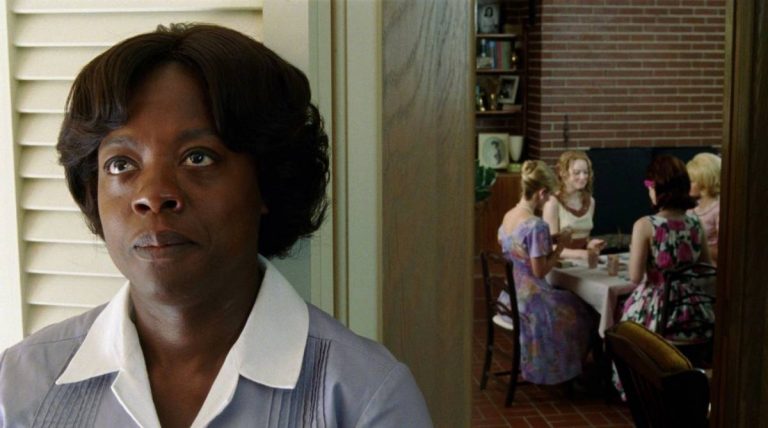250 films, 250 reviews. This is a pretty crazy idea, but who doesn’t love a challenge? Here at Cultured Vultures we’ll be counting down the IMDb Top 250 with a review for each from one of our dedicated film writers. Everything from Goodfellas to Casablanca will be covered over the next year or so for you film lovers to enjoy. You can’t say we don’t spoil you, you lovely lot. – Ashley, Project Lead
I may have trouble remembering my own name, or what country I live in, but there are two things I can’t seem to forget: that my own daughter threw me into a nursing home, and that she ate Minny’s shit.
Halfway through The Help, a shit pie shows up. The movie doesn’t tell you right away that it’s a shit pie, but let’s look at the circumstances surrounding its delivery: Minny (a house maid played by Octavia Spencer) has just been fired by Hilly (who is played with a smirking lack of subtlety by Bryce Dallas Howard) for using the family bathroom rather than the outhouse on a rainy night.
Hilly, you see, is leading a group that has drafted an initiative stating that all white families who employ black maids must have separate bathrooms for them to use. Because, as Hilly points out in terrified whispers, those black people carry “different diseases” than whites do. So Hilly’s a monster. Clearly. And also hopelessly naive, for when the maid that she just fired for taking a shit in her home shows up the next day holding a pie that looks, for all the world, like it is composed of human feces, she invites her in and chows down. And it turns out that Minny’s shit is delicious. Hilly digs into two pieces, licking her fingers with disgusting, succulent slurps.
That scene, even devoid of context, gives you an idea of the general lack of nuance or originality in The Help. It’s the kind of movie that would rather be epic than subtle, that’s so focused on delivering easy laughs or pathos to the masses that it forces its characters into unbelievable situations. It wants to be To Kill a Mockingbird, but it’s also content to make gags straight out of Van Wilder.
But the pie scene is damning for an even more important reason than that. The movie presents Minny’s defiant declaration to Hilly, “Eat my shit,” as a victory. That is the most direct example, in this film, of the maids taking agency over their own lives, without an assist from some kind-hearted white person. The Help is the most recent example of a type of movie that frames the struggle for black civil rights through the eyes of well-meaning white folk. For most of the movie, we follow a young white girl, Skeeter (Emma Stone) as she tries to put together a book which will allow the maids of Jackson, Mississippi to finally tell their side of the story.
She begins collecting stories from the maids, which only raises the question of why the movie itself isn’t about those stories. Skeeter’s story just isn’t as interesting as the story of the maids. While Minny and her friend Aibileen (Viola Davis) deal with abusive husbands, dead children, and an entire society built to make them feel less than human, Skeeter deals with the expectations of her mother and friends to settle down. On its own, Skeeter’s story would be fine, but when juxtaposed against the story of the maids, it feels slight.
The movie would like to draw a connection between the civil rights movement, as represented by the maids, to the burgeoning feminist movement, as represented by Skeeter, but there’s one major problem with that: at no point in the movie is Skeeter’s gender a hindrance to her success. By the end of the movie, Skeeter has realized her every ambition and managed to shake off a lousy match with a man she never wanted anyway. She reconciles with her mother, publishes a best-seller, and gets to live out her dreams in New York. She gets off-the-scale happiness, and we get to watch her realize it. We’re told through narration that the maids will be similarly happy in their new lives, but we don’t get to see these moments, as if The Help is only interested in their suffering, not their joy.
The film also brushes up against stereotypes in a shockingly tone-deaf way. At one point, Minny says, “fried chicken tends to make you feel better about life.” Why the film presents that particular stereotype as a character quirk, while others are shown to be as hurtful and untrue as they are, is hard to say, but is another example of the troubling way that black characters continue to be portrayed on screen, even in movies that pretend to be down with their struggle. It’s no surprise that Octavia Spencer was awarded an Oscar for her familiarly sassy performance as Minny, while Viola Davis was passed over for her more restrained and powerful take on Aibileen. This is still what Hollywood expects black actors to do.
The Help looks beautiful. The cinematography (by Stephen Goldblatt) helps create a vivid depiction of the 1960’s, from the crispness of the hoop skirts to the casual rot of the maid’s homes. The cast is one of the finest in recent memory (a late scene between Allison Janney and Cicely Tyson is particularly moving, if as peppered with cartoon villainy as the rest of the movie). But like Minny’s pie, The Help uses all of that surface gloss to cover up a real pile of shit.
Note: the IMDb Top 250 Cultured Vultures are using is based on the standings from the 16th of November. Inconsistencies may apply.
Some of the coverage you find on Cultured Vultures contains affiliate links, which provide us with small commissions based on purchases made from visiting our site. We cover gaming news, movie reviews, wrestling and much more.



